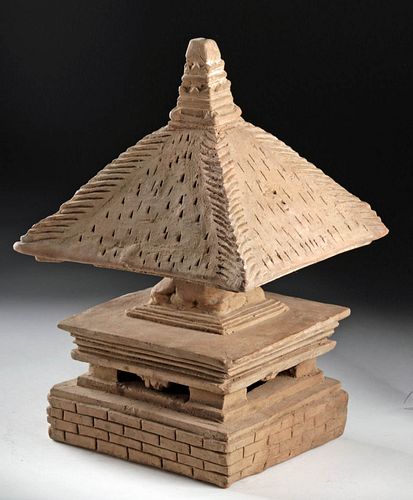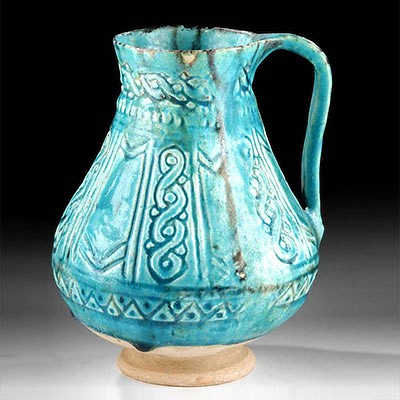14th C. Majapahit Terracotta Model of a Chorten / Stupa
Lot 36
About Seller
Artemis Gallery
686 S Taylor Ave, Ste 106
Louisville, CO 80027
United States
Selling antiquities, ancient and ethnographic art online since 1993, Artemis Gallery specializes in Classical Antiquities (Egyptian, Greek, Roman, Near Eastern), Asian, Pre-Columbian, African / Tribal / Oceanographic art. Our extensive inventory includes pottery, stone, metal, wood, glass and textil...Read more
Categories
Estimate:
$3,000 - $4,500
Absentee vs Live bid
Two ways to bid:
- Leave a max absentee bid and the platform will bid on your behalf up to your maximum bid during the live auction.
- Bid live during the auction and your bids will be submitted real-time to the auctioneer.
Bid Increments
| Price | Bid Increment |
|---|---|
| $0 | $25 |
| $300 | $50 |
| $1,000 | $100 |
| $2,000 | $250 |
| $5,000 | $500 |
| $10,000 | $1,000 |
| $20,000 | $2,500 |
| $50,000 | $5,000 |
| $100,000 | $10,000 |
| $200,000 | $20,000 |
About Auction
By Artemis Gallery
Oct 29, 2020
Set Reminder
2020-10-29 12:00:00
2020-10-29 12:00:00
America/New_York
Bidsquare
Bidsquare : Art of Asia | Antiquity to Modern Day
https://www.bidsquare.com/auctions/artemis-gallery/art-of-asia-antiquity-to-modern-day-5906
Join us for a special auction featuring artifacts and fine art from the continent of Asia - from Warring States to Western Asia, this auction will have something for everyone. This is one you won't want to miss. Professional in-house shipping for your convenience! Artemis Gallery info@artemisgallery.com
Join us for a special auction featuring artifacts and fine art from the continent of Asia - from Warring States to Western Asia, this auction will have something for everyone. This is one you won't want to miss. Professional in-house shipping for your convenience! Artemis Gallery info@artemisgallery.com
- Lot Description
Southeast Asia, Indonesia, Java, Majapahit Empire, ca. 14th to 15th century CE. An evocative terracotta votive model of a chorten (also called a stupa), a Buddhist religious monument that symbolizes the Buddha's presence. This example shows a symmetrical, tiered building. Its square base is a series of carefully incised terracotta that looks like bricks in four narrow rows; above that is a low, four-legged platform with decorative pottery that looks like cloth swags between the legs. The platform is made of multiple flat, square layers which gradually widen, creating a wide space for the footprint of the flared-footed, wide column that supports the roof. The roof is large, with four triangular faces to create a pyramidal form; this hangs out over the edges of the rest of the temple. A tall, tiered spire rises from the center. The roof is incised to give an appearance of being made from wood or overlaid fronds. Size: 7" L x 6.75" W x 12.45" H (17.8 cm x 17.1 cm x 31.6 cm)
During the later Majapahit Empire, the buildings of East Java - both religious and secular - were decorated with friezes made from stone and terracotta. A votive stupa like this would have had its place in a building like that. The brick so artfully depicted on the base of this sculpture is a delightful reminder of the brick architecture of the Majapahit capital, Trowulan, which remains today. Thin layers of brick allowed Majapahit artists to create dramatic visual effects with their buildings, as at Candi Brahu.
Provenance: private Hawaii, USA collection; ex-private De Maria collection, Italy, 1998
All items legal to buy/sell under U.S. Statute covering cultural patrimony Code 2600, CHAPTER 14, and are guaranteed to be as described or your money back.
A Certificate of Authenticity will accompany all winning bids.
We ship worldwide and handle all shipping in-house for your convenience.
#146139Repaired and restored from multiple pieces. This is well done and almost impossible to see. Most repairs are on the edges of the roof and the corners of the lower body.Condition
- Shipping Info
-
All shipping is handled in-house for your convenience. Your invoice from Artemis Gallery will include shipping calculation instructions. If in doubt, please inquire BEFORE bidding for estimated shipping costs for individual items.
-
- Buyer's Premium



 EUR
EUR CAD
CAD AUD
AUD GBP
GBP MXN
MXN HKD
HKD CNY
CNY MYR
MYR SEK
SEK SGD
SGD CHF
CHF THB
THB














